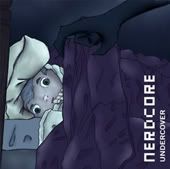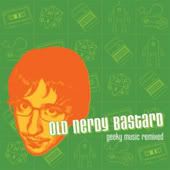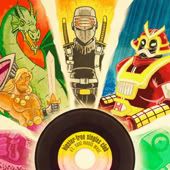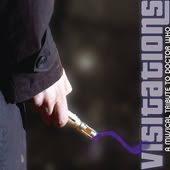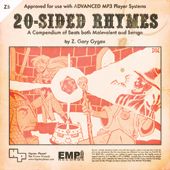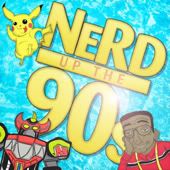
A month ago I hadn't even heard the name
Adam WarRock. Yet today I sit here typing a lengthy missive concerning a release that has become, at least on my end, hotly anticipated.
When Eugene Ahn first introduced himself (and his comic book alter ego) to me a few weeks back, I had already put a moratorium on album reviews to focus on a backlog of freelance work and a special project of my own. Still, I agreed to review his just released concept album
The War for Infinity. Mostly because I could not, in good conscience, say no to a man capable of rapping about classic Marvel crossovers and the importance of personal artistry with equal conviction.
Speaking of the former, it's important to note that
The War for Infinity
is roughly rooted in the happenings of early 90s limited series
The Infinity Gauntlet
. Of course in this version the role of hero
Adam Warlock is filled by Ahn and the part of cosmic despot
Thanos (rechristened Demonos) is played by guest MC Tribe One.
Oh, and they settle their differences via rap battle… though I imagine that point should be fairly obvious.
The War for Infinity kicks off with "
I Am Him
," a strong intro that weaves the preternatural mythos of Marvel's Warlock with the swagger of our own WarRock. This leads us straight into "
Absolute Truth
," another fantastic cut with a near-perfect beat compliments of
Ruckus Roboticus, the cat that helms the album's overall production. Adam also holds up his end of the track ably throughout the verses, although the chorus lacks a certain flair.
"Absolute Truth" trails nicely into "
Bad Mother (Villainy)
" a darker and more densely layered joint that sounds both fierce and cerebral. Adam uses this track as an opportunity to loosen the pretense of the core narrative and weigh in a bit concerning the media fascination with the ongoing American
culture wars. "
Interlude - He Watches
" follows suit and serves as an odd atmospheric bridge to "
The View from Eternity
," which injects a bit of soul into the proceedings. Adam's slowed-down flow seems a bit labored at times, but the storytelling is absolutely engaging and the production fantastic.
At more than 5 minutes in length, "
Battle (Introductions)
" has great potential to get repetitive and boring, but it never does. WarRock comes through with his best offering thus far, and the interplay between Adam and his foil (Atlanta's Tribe One under the guise of antagonist Demonos) makes this an early standout.
"
Crooked Deal
" is another triumph of production that combines ambient keys and dynamic vocal effects to craft a borderline horrorcore jam that outlines a Faustian deal within this comic book reality. Follow-up "
Interlude - The Gauntlet
" is a fine tongue-in-cheek lead-in to "
Special Bulletin
," which actually breaks some new hip-hop ground by cleverly folding comic-style exposition into its proper lyric structure – it's another stunning selection.
"
Heroes Requiem
" is almost pure comic book fan service, but it works well within the confines of the album. My only knock is that lyrically it sometimes seems to forget the rule of showing not telling. Still, it's a forgivable trespass as it serves as the central hub of the tale that is
The War for Infinity.
We revisit to the arena with "
Battle (Reprise)
," a track that sees another return to form by combining comic fanboyism within the classic battle rap motif. Musically it boasts a hint of minimalist house and the vaguest shades of spaghetti western. It's easily one of the project's best.
Thereafter, "
Interlude – Limbo
" takes us into "
Laxidazia
," yet another instantly engaging selection from an album packed with enjoyable content. It incorporates the concept of Adam's metamorphosis/recuperation in cleanly-metered verse atop a fantastically smooth beat. Still, as fine a track as it is, it's outshined by "
Up & Adam
." This one's stylistically 180 degrees from "Laxidazia," and it somehow manages to sound funky, frenetic and undeniably beautiful all at the same time.
The album begins its final act with skill and swagger in equal measure as our hero returns to the mat in "
Battle (Finale)
." Even better than the two previous rounds, it sets the stage for the project's musical and thematic wind-down. This delicately fades to "
Lady Death Never Wanted Me as a Lover
," a surprisingly poignant number that, at nearly 6 minutes in length, almost overstays its welcome. Still, it tries some 11th hour musical experimentation that actually works, and that's something to be applauded. The final full minute of the song demonstrates a nice use of the false ending that leads us to Adam WarRock's veritable mission statement: "
The Silver Age
."
He and Tribe One wrap up the album-proper by reflecting both on the tale that is
The War for Infinity and their own unique position within rap canon. It's a musical meditation on old school comics, new school hip-hop and a sharp study of pop culture that is the album's true high-water mark. It's the perfect place to end our story. And yet it doesn't.
Bonus track "
Ira Glass
" departs the album arc in favor of celebrating the spirit of creativity and the role that personal experience plays in shaping art. It's a fine selection that offers a clever nod to the
titular PRI mainstay, but it could conceivably be accused of diluting an otherwise solid concept album. Still, it's an admitted bonus track, so my suggestion is to enjoy it as an additional, unrelated nugget of highbrow hip-hop.
The War for Infinity (specifically) and
Adam WarRock (in general) represent a perfect storm, an ideal marriage of real nerd culture and real hip-hop. And though this isn't quite as rare as one may be lead to believe by the album's written introduction (no disrespect intended to
Chris Roberson) that doesn't make it any less enjoyable.
I've got my handful of requisite gripes, sure – the vocals are occasionally a bit muddy for my taste and the finer points of the plot itself may be lost on those unfamiliar with the source material – but I have no choice but to suggest you dive into the sometimes murky waters of WarRock's
brilliantly fictitious wartime autobiography. It's an amazing ride, and, further, an album that certainly warrants all the buzz it will unquestionably generate.
Much like his namesake, Adam WarRock possesses an uncanny ability to shape worlds with his might. Luckily for us he also demonstrates a comparable level of heroic integrity in the face of the sinister forces that are the piss-poor lyricism and insincere club cuts of contemporary radio rap.
"It stings like a cigarette."
 A month ago I hadn't even heard the name Adam WarRock. Yet today I sit here typing a lengthy missive concerning a release that has become, at least on my end, hotly anticipated.
A month ago I hadn't even heard the name Adam WarRock. Yet today I sit here typing a lengthy missive concerning a release that has become, at least on my end, hotly anticipated. 



